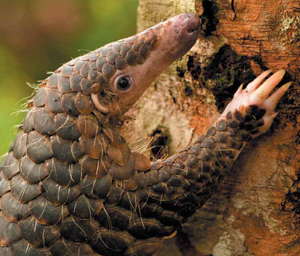Pangolins threatened by illegal trade for traditional Chinese medicine
While their trade has been prohibited under the Convention on International Trade in Endangered Species of Wild Fauna and Flora (CITES) since 2002, Asian pangolin populations are rapidly declining due to poaching for use in traditional Chinese medicine, report conservationists. Trade has nearly wiped out the species in Cambodia, Viet Nam and Laos, once strongholds for the scaly, toothless anteater. “China has a long history of consuming pangolin as meat and in traditional medicine,” the report, published by the wildlife trade monitoring network, TRAFFIC, states. “Due to continual demand and the decreasing Chinese wild population, in the past few years pangolin smuggling from Southeast Asia has resulted in great declines in these producing countries’ wild populations, as well.” TRAFFIC says pangolins are the most frequently encountered mammals seized from illegal traders in Asia. Recent hauls include 24 tons of frozen pangolins from Sumatra, Indonesia, seized in Viet Nam this March and 14 tonnes of frozen animals seized in Sumatra this April. “Pangolin populations clearly cannot stand the incessant poaching pressure, which can only be stopped by decisive government-backed enforcement action in the region,” said Chris Shepherd, Acting Director for TRAFFIC Southeast Asia. The report notes that an important service performed by pangolins is at risk from over-collection. “Pangolins save us millions of dollars a year in pest destruction,” said Dr Simon Stuart, Chair of the IUCN Species Survival Commission. “These shy creatures provide a vital service and we cannot afford to overlook their ecological role as natural controllers of termites and ants.” …
Pangolins threatened by illegal trade for traditional Chinese medicine
